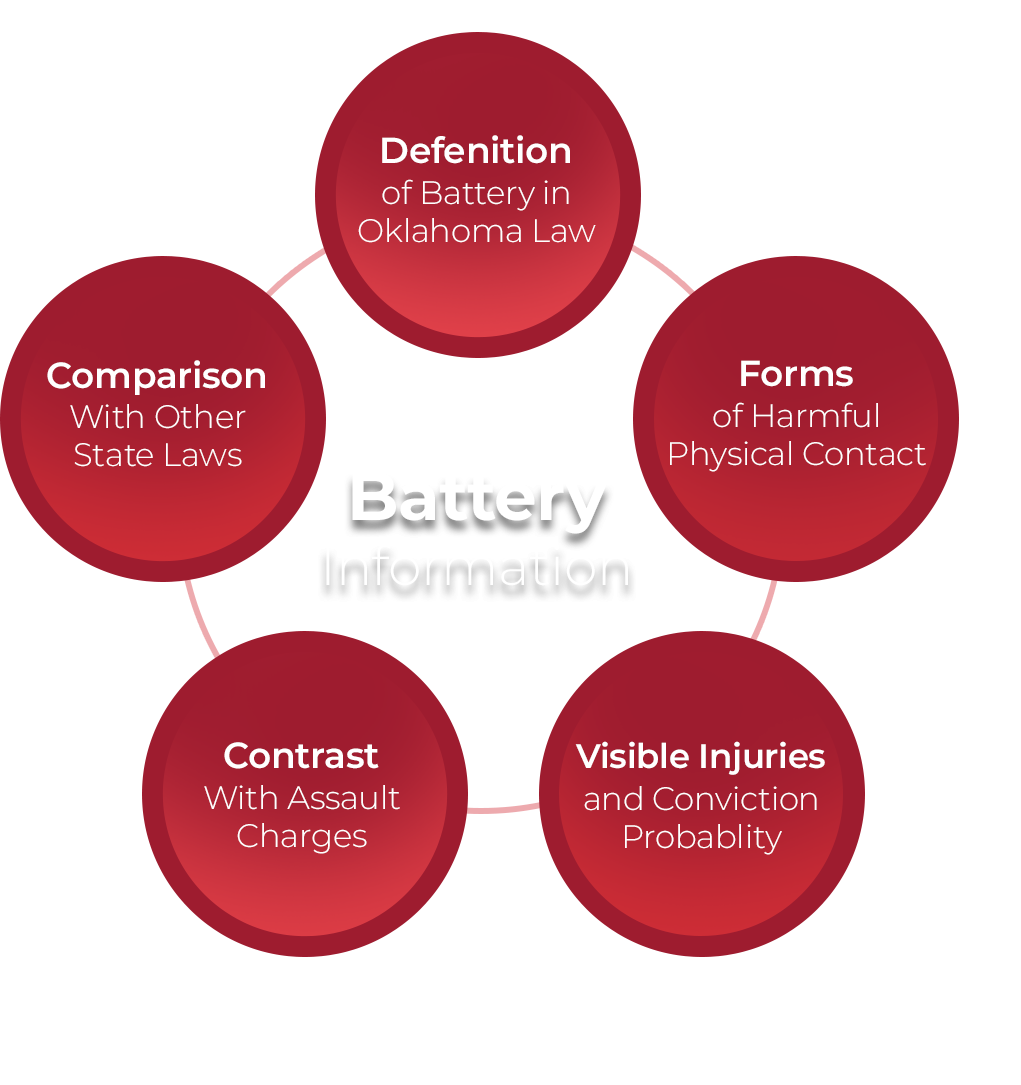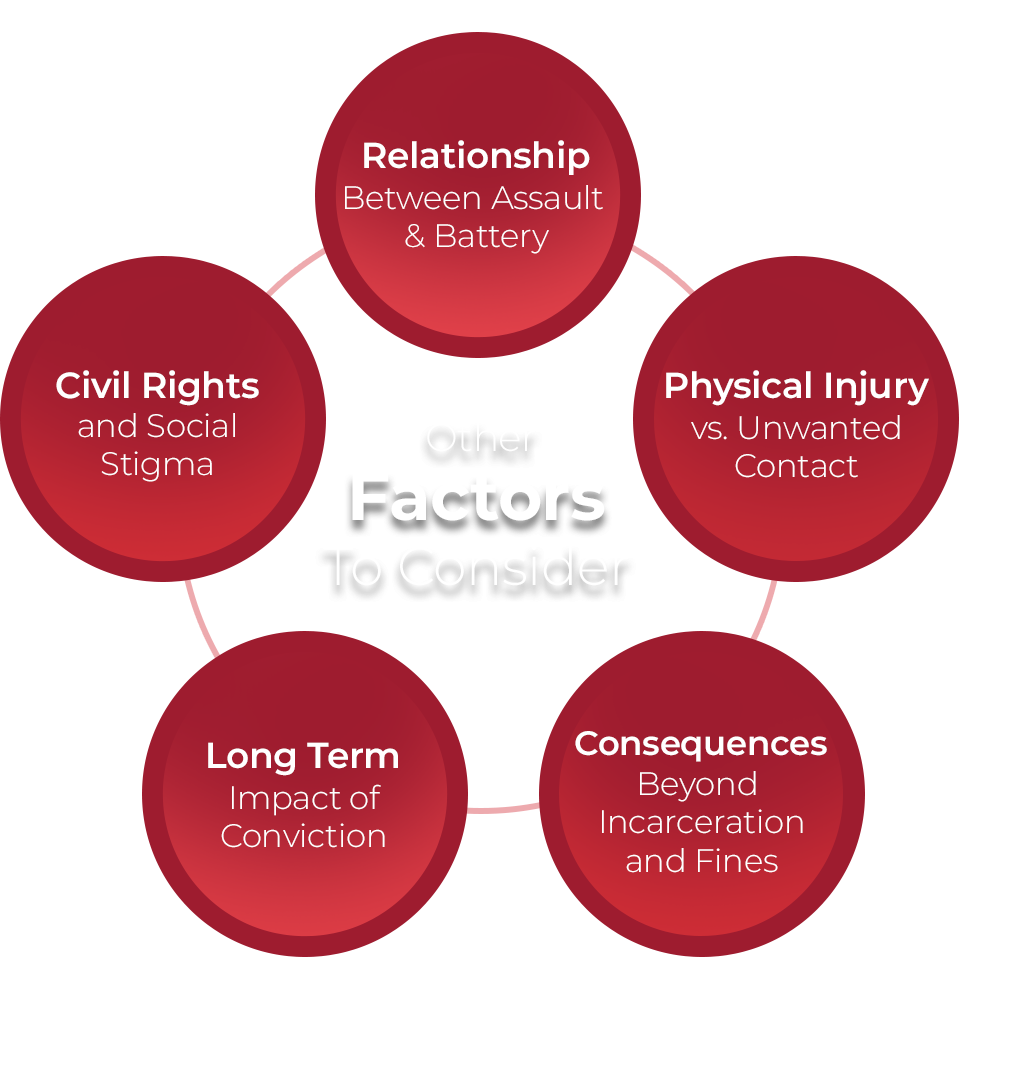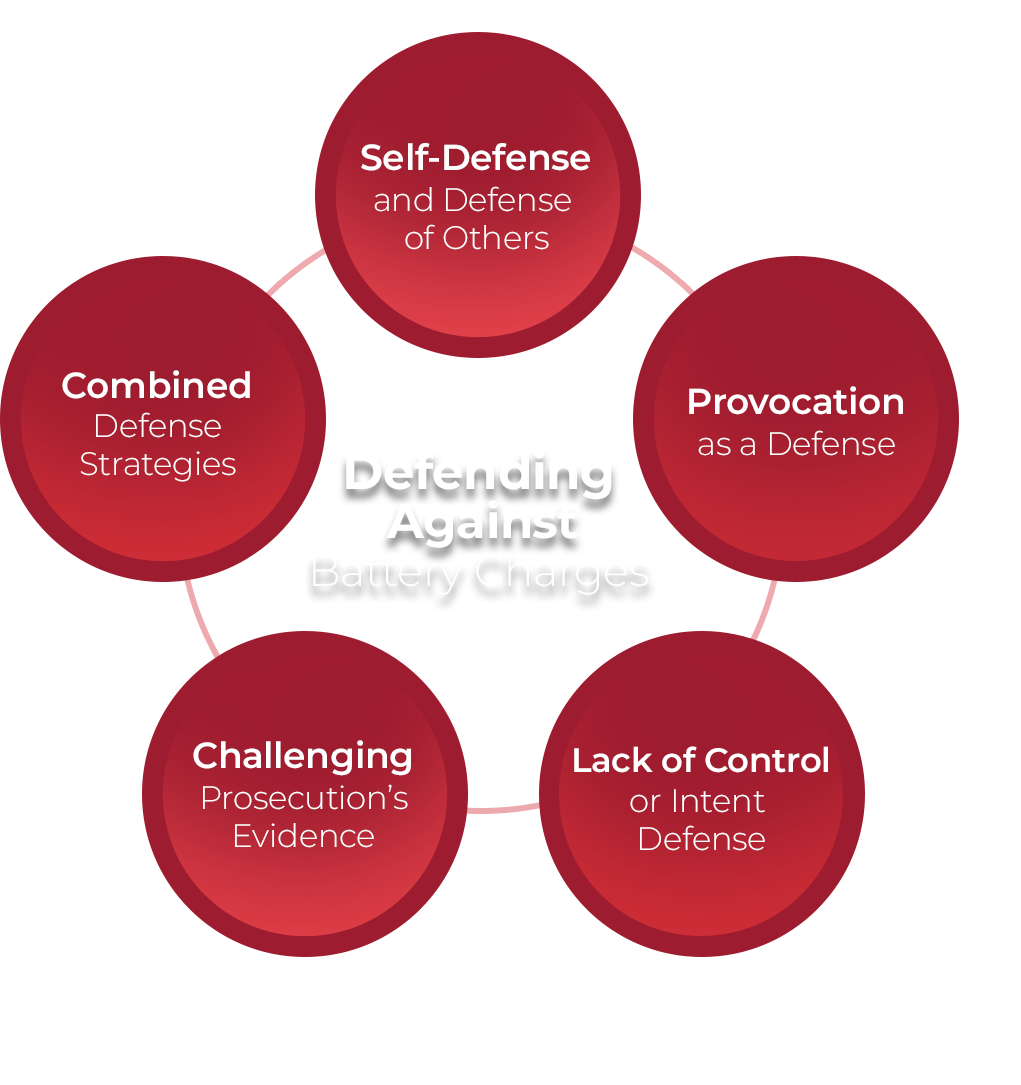
Oklahoma Battery Attorneys
Charged with Battery in Oklahoma?
If you’ve been arrested or charged with battery in Oklahoma, you’re likely worried about your future. Even a simple battery conviction can carry jail time, fines, and a lasting criminal record. At Hunsucker Legal Group, our skilled criminal defense attorneys are here to protect your rights and help you fight back with a powerful, personalized defense strategy.
FREE Case Evaluations: Fill Out A Free Online Evaluation Today!
Oklahoma’s Legal Definition of Battery (§21-642)
Under Oklahoma Statutes Title 21 §21-642, battery is defined as:
“Any willful and unlawful use of force or violence upon the person of another.”
This means that any intentional and unlawful physical contact — even without causing visible injury — may be considered battery under Oklahoma law. Actions like pushing, slapping, punching, or using a weapon or object (like a bat or bottle) could all result in criminal charges.
How Battery Differs From Assault in OK (§21-641)
- Assault is defined as:
“Any willful and unlawful attempt or offer with force or violence to do a corporal hurt to another.”
In other words, assault can occur without physical contact, such as making a threatening gesture or raising a fist.
- Battery, on the other hand, requires actual physical contact — even minor — that results in harm or offense.
Many defendants are charged with assault and battery, and understanding the nuances of each is critical to building your defense.
Types of Battery Charges in Oklahoma
Battery charges can vary in severity, depending on the circumstances of the alleged incident. Common examples include:
- Simple Battery (a misdemeanor)
- Aggravated Battery
- Domestic Battery
- Battery Against a Police Officer
- Assault and Battery With a Dangerous Weapon
- Felony Assault and Battery
Each carries different potential penalties. Our team handles all varieties of battery charges and will break down the specific allegations against you during your consultation.
Oklahoma Battery Penalties
| Charge Type | Jail Time | Fines | Classification |
|---|---|---|---|
| Simple Battery | Up to 90 days | Up to $1,000 | Misdemeanor |
| Battery on a Police Officer | Up to 5 years | Higher penalties | Felony |
| Assault and Battery With Dangerous Weapon | Up to 10 years or more | Varies | Felony |
| Domestic Battery (1st offense) | Up to 1 year | Up to $5,000 | Misdemeanor or Felony |
How Hunsucker Legal Group Can Help
At Hunsucker Legal Group, we know that being charged with battery does not mean you're guilty and it certainly doesn't mean you're alone.
Our team has successfully defended hundreds of clients across Oklahoma by:
- Analyzing evidence for inconsistencies or illegal procedures
- Challenging witness credibility and physical evidence
- Identifying self-defense or mutual combat claims
- Negotiating reduced charges or case dismissals where possible
- Preparing aggressively for trial when necessary
You don’t just get a lawyer — you get an entire defense team committed to preserving your freedom, your record, and your future.
Why Clients Trust Us
With 700+ five-star Google reviews, we’ve earned a reputation for being aggressive, honest, and relentlessly dedicated to our clients. When your future is at stake, don’t settle for anything less.
The sooner you contact a Oklahoma battery defense attorney, the better your chances of a successful outcome. Let us help you understand your rights and fight back.
Frequently Asked Questions
Is battery a felony in Oklahoma?
It can be. Simple battery is typically a misdemeanor, but battery involving weapons, police officers, or domestic partners can be charged as a felony.
How do you beat a battery charge in Oklahoma?
Each case is unique. Possible defenses include lack of intent, self-defense, mutual combat, or insufficient evidence.
Can I be charged with assault and battery at the same time?
Yes. If you both threatened harm and followed through with physical contact, you may face both charges.
Do I need a lawyer for a misdemeanor battery charge?
Absolutely. Even misdemeanor charges can lead to jail time and a permanent record. A skilled attorney can help protect your future.

Other Factors to Consider
Simple battery is often referred to as assault and battery as the two crimes are often charged together, representing the two distinct phases of an incident of violence. As assault involves the threat of violent harm and battery the execution of that threat, the one generally results in the other. By issuing charges for both, prosecutors are able to more effectively address the initial threat and resulting altercation.
As the root of both assault and battery stems from simple unwanted contact, it is possible for charges to result without any kind of physical injury. In addition, various factors involved in the inciting incident can play a role in whether a battery charge is treated as a misdemeanor or a felony.
And beyond the incarceration and fines outlined above for the various types of battery charges, a conviction can have several added consequences. These range from probation and community service to mandatory counseling. Those convicted may also be placed under restraining order by the victims and be required to pay them financial restitutions.
Beyond that, the long-term consequences of a conviction can be impactful for years. A battery charge on a person’s permanent criminal record can lead to a loss of certain civil rights such as voting and firearm ownership, as well as difficulties securing employment or housing. That’s to say nothing of the social stigma they will face, and the ensuing personal stress, as a convicted criminal.


Defending Against Battery Charges
If you or a loved one has been charged with battery, there are several ways that an attorney can mount an effective defense. Several strategies include:
- Acting in Self-Defense or Defense of Others: This defense aims to prove that the defendant felt that there was an imminent threat of harm to themselves or those around them and used force as a means of defense.
- Provocation: Less of a justification for the defendant’s actions, this defense aims to provide context to the judge or jury regarding their actions, helping to explain their actions during the inciting incident.
- Lack of Control or Intent: Another defense that doesn’t necessarily require justifying the defendant’s actions, this strategy shows a judge or jury that the defendant was not in full control of their actions due to extenuating circumstances such as intoxication, and that their actions were unintentional.
- Challenging the Prosecution’s Evidence: As the burden of proof rests on the prosecution to demonstrate guilt, this strategy undercuts the validity of their argument by undermining the evidence they’ve gathered. Whether that means establishing an alibi or disputing forensic accuracy or police procedures, this strategy aims to diminish the case against the defendant.
Any or all of these strategies used together can provide a compelling case for the defendant, while creating reasonable doubt regarding the prosecution’s case.
-
 WRONGLY ACCUSED?
WRONGLY ACCUSED? -
 COURT DATE PROCESS
COURT DATE PROCESS -
 CRIMINAL FAQ'S
CRIMINAL FAQ'S
-
 DEFENDING OVER 500 CRIMINAL CASES A YEAR John Hunsucker, Director on the Board of the Oklahoma Criminal Defense Lawyer’s Association
DEFENDING OVER 500 CRIMINAL CASES A YEAR John Hunsucker, Director on the Board of the Oklahoma Criminal Defense Lawyer’s AssociationWith decades of courtroom experience, John Hunsucker leads one of Oklahoma’s most respected criminal defense teams. As a former prosecutor and seasoned trial attorney, he brings unmatched insight and strategy to every case. John and his team prioritize continuing legal education and advanced training each year, ensuring they remain at the forefront of criminal defense not just across Oklahoma, but nationwide.
-
 Client Reviews "I can't express enough the blessing he is for seeking the correct justice in my time of need."
Client Reviews "I can't express enough the blessing he is for seeking the correct justice in my time of need."I truly appreciate the work and worry of this office. Doug took my case with ease and kept it as a priority!! I was updated the whole time and even felt unfazed of the outcome, Doug is an amazing attorney in which I highly recommend.
- JaQuez F.
-
 CLIENT REVIEWS David Hammel and the entire time made a very difficult situation infinitely easier.
CLIENT REVIEWS David Hammel and the entire time made a very difficult situation infinitely easier.Everything turned out better than I had hoped and they took away a lot of stress and anxiety. Cannot recommend them enough.
- Andy L.













